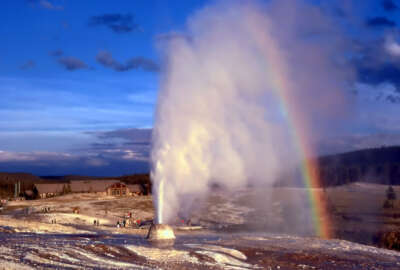
Visitors to popular National Parks may experience different kind of hike
In today's Federal Newscast, the National Park Service has issued a proposal to increase entrance fee prices at a handful of the nation's most popular parks.
To listen to the Federal Newscast on your phone or mobile device, subscribe on PodcastOne or iTunes.
- The National Park Service (NPS) has proposed an increase in entrance fees for some of the most popular national parks to help pay for infrastructure improvements. The fees at 17 national parks, including Grand Canyon, Yosemite, and Yellowstone, would jump to $70 for a private vehicle, up from the current $30. Comments on the proposal are due by November 23. (National Park Service)
- The General Services Administration’s Green Building Advisory Committee has recommended federal buildings be retrofitted at a faster pace. The committee said it wants to see the rate cut in half over the next five years. Only about 2 percent of the 230,000 federally-owned buildings are considered sustainable under the federal real property profile.
- The Consumer Financial Protection Bureau (CFPB), created during the Obama era, has received its first push-back from the Republican Congress. The CFPB has had a clear field for rule-making since its inception in 2010. But now Congress has overturned a rule barring arbitrage in bank mortgage agreements with consumers. The rule would have enabled class action suits. The House voted against the rule in July. The Senate did do yesterday, in a tie vote broken by Vice President Mike Pence. President Trump is expected to sign the measure. (Congress.gov)
- A federal judge has tossed out a lawsuit accusing an executive order from President Trump of violating U.S. Transportation Command employees’ constitutional rights. Law360 reported the judge found the exec order barring USTRANSCOM workers from collectively bargaining with the Defense Department did not violate the first amendment, and lawfully relieved DoD of any obligation under the Federal Service Labor-Management Relations Statute. (Law360)
- Recommendations made by the Future of the Army Commission have not fallen on deaf ears. The Pentagon has agreed with all of those involving the Defense Department. The recommendations included keeping some Apache helicopters in National Guard units and continuing to fund the Army’s integrated personnel and pay system. (Federal News Radio)
- The Defense Innovation Board has shifted its focus to cultural issues within the Pentagon, including the way it manages talent. The advisory board said it is working its way through a new set of draft recommendations, including several that would change the military’s personnel system to encourage more innovation. One idea would create an exception from the up-or-out promotion system to let military members work on problems for longer without having to rotate to new assignments. Another would create a specialized career branch dedicated to science, technology, engineering and math fields. (Federal News Radio)
- Veterans Affairs (VA) Secretary David Shulkin said it’ll take seven or eight years before the department has true interoperability with the Defense Department and its network of private care providers. VA will begin negotiating the terms of its contract with Cerner Corporation for a new electronic health record , and will implement it 18 months after those negotiations conclude. (Federal News Radio)
- Debate over the future of the Veterans Choice Program has begun in earnest. Both the VA and the House Veterans Affairs Committee have proposals to drastically change the program. No price estimates for the new program have been revealed, but Secretary Shulkin said administrative changes to the current program would save billions of dollars over 10 years. Shulkin said he’s still negotiating the budgetary details of his proposal with the Office of Management and Budget. (Federal News Radio)
- The shuffle of agency CIOs continued this week. The Transportation Department (DoT)said it is getting an experienced hand to be its next senior IT executive. A DoT spokeswoman confirmed Vicki Hildebrand started her new CIO job Tuesday. She came to DoT after spending more than 30 years with Hewlett Packard. Meanwhile, at the U.S. Patent and Trademark Office (USPTO), John Owens announced he will leave on Nov. 3. After a decade with the agency, he told the staff he feels good about the state of IT at the USPTO having helped modernize the agency’s infrastructure and mission-critical systems. (Federal News Radio)
Copyright © 2024 Federal News Network. All rights reserved. This website is not intended for users located within the European Economic Area.
Eric White
Eric White is news anchor and Federal Drive producer at Federal News Network.
Follow @FEDERALNEWSCAST
Related Stories
Related Topics



